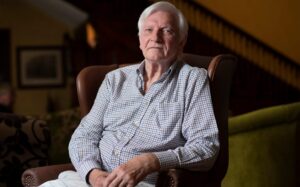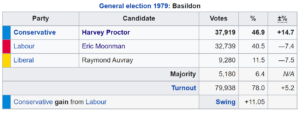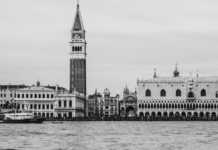
By Andy McDonald, Assistant Editor
Last week our Assistant Editor, Andy McDonald, had the pleasure of sitting down with former MP for Basildon, and Billericay, Harvey Proctor. After serving two full terms as a Member of Parliament, Harvey set up his own shirt and tie business, became the Personal Secretary to the Duke and Duchess of Rutland, and was a victim of the lies told by Carl Beech.
Alongside a number of spymasters, senior politicians, Lords, and defence staff to have been at the receiving end of the false allegations and lies of Carl ‘Nick’ Beech, Harvey was one of the men investigated in Operation Midland. However this is not the first time that he has been hounded by the media, as he revealed in our chat.
For anybody who followed the UK political scene in the 1980s, it would be difficult to have not been aware of the ‘Blonde Bachelor’ Harvey Proctor, particularly given his strong stances on topics such as immigration and opposition to the Anglo-Irish agreement of 1985. Despite what some people would call ‘controversial’ stances on such policies, he was incredibly popular within his constituencies. In 1979 Harvey won the Basildon constituency, a rather large one at the time, and one that was seen as difficult for the Conservative Party to win. He won the seat with a 5,180 majority, swinging the seat from a 10,551 Labour majority the previous election.

Despite knowing that he was a gay man, the topic had never come up both within his constituency, and the Conservative Party, both local and national. Despite not being out, he ‘always supported and voted for pro-homosexual reform’, and ‘never lied about the topic, merely avoided the conversation’. He was outed in 1986/7 with the scandal of him engaging in ‘relationships of a sexual nature’ with what were considered minors at the time, given the fact that the age of consent for homosexual relationships at the time was 21. This legislation has since been reformed, and the age of consent levelled out to 16. All individuals who were convicted under this legislation have been offered the opportunity to have their convictions repealed, Harvey is yet to as ‘with the whole investigation going on with Operation Midland and the subsequent fallout, it was really not a priority’.
Many people know what happened to Harvey in 1986/7, but not many know why, we were lucky enough to get the inside story from him. According to Harvey, there had been a ‘major fallout’ between himself and the late Robert Maxwell, former MP and Daily Mirror boss. There had apparently been two major issues that caused Maxwell’s sights to be set on him, the first of which being that he had beaten Eric Moonman, a close friend of Maxwell’s in the 1979 General Election in Basildon. The second reason being that Harvey had pursued legal action against Maxwell for libelling him, in regard to the manner of which the Prime Minister, the late Baroness M. Thatcher, had interacted with him in the house; inferring in a way that he was ‘dishonourable’ by not using the correct parliamentary lingo of ‘my honourable friend’ when addressing him. This was proved to be false in a court of law, and an apology was made both in the court and in the press. The subsequent embarrassment was what caused Harvey to be a target of one of Maxwell’s papers, The Sunday People, when it came to rumours regarding his personal relationships.

The subsequent targeting of rumours about Harvey did eventually gain some traction, when Annette Witheridge, of The Sunday People, published the details of various relationships with men that Harvey was alleged to have been involved in. When Harvey was convicted in 1987, he revealed to me that he did not in fact resign as an MP straight away. He in fact served out the length of his term as Member for Billericay, the side of the constituency he had chosen when Basildon split into two, and actually ‘gained the parliamentary candidacy nomination from the local association’ despite ‘Maxwell sending about twenty journalists down to the local [Conservative] association meetings where a motion of no confidence had been tabled due to my media coverage’.
Following his stepping down from the House of Commons, he secured some funding from various Conservative MPs to start up a shirt and tie shop in London. The claim to fame of the shop was that a Prime Minister, John Major, actually bought from the shop. Harvey managed to remain out of the public eye for almost thirty years until ‘an Armageddon’ hit him.
We will be covering the ins and outs of Operation Midland, from Harvey’s perspective, in another article very soon. One of the most notable parts however is the fact that a certain Member of Parliament, Tom Watson, was a huge advocate of the lies of Carl Beech, even being described by Beech as ‘part of his team’. Whilst a Member of Parliament, Watson ‘exerted undue influence on the police and the Director of Public Prosecutions’ particularly in relation to Operation Midland and Operation Vincente, with Harvey believing that is this undue pressure that drove Lord Brittan to an early death.
Watson ‘snubbed parliamentary convention by meeting Beech’, who was not a constituent of his, at the Commons in his pursuit for evidence to corroborate his 2012 claim that there was an all-powerful Westminster VIP paedophile ring. By meeting with ‘various fraudsters and fantasists’, Watson added credibility to false allegations, hearsay, and rumours. He also met with former Labour Councillor, and convicted fraudster Chris Fay, a man responsible for pushing false claims of ‘high-level sexual abuse of children’ at the now Elm Guest House in south-west London.

Watson not only advised Carl Beech to ‘correctly’ go to the police but then ‘incorrectly’ kept in touch with him by email. The police were in ‘such fear and dread of Watson after his phone-hacking campaign days’ that Operation Midland’s Senior Investigating Officer, Diane Tudway, listed ‘Watson’s meddling’ as a ‘priority’ and called for a review of ‘how we can deal with him’.
In Proctor’s eyes, ‘Watson’s judgement has been found to be, repeatedly and consistently, at fault.’ Harvey believes that ‘Watson should now show remorse and admit he was economical with the truth, at best.’. One of the most poignant things that Harvey said regarding Watson is that he ‘should not be allowed to stain the benches of the House of Lords’. He has ‘crucified the reputations of others who sat in the House of Lords for no just reason’. Proctor also commented on Sir Keir Starmer, the Director of Public Prosecutions at the time and now Leader of the Labour Party, believing that his nomination of Watson ‘illustrates his distinct lack of judgement that he extended whilst in office as DPP. Sir Starmer is not fit for office.’.
If anybody with a stake in Operation Midland would like to get in touch to discuss OM please email editor@thelondonfinancial.com
Andrew is the Assistant Editor of The London Financial. He was previously the Political Editor and a Political Writer. Away from TLF he is the Director of an education policy campaign and runs digital campaigns for trade unions. He is a fan of Notts County FC and is interested in nuclear reform applied to transport.






























Great post, I truly enjoyed reading it. Your writing style is extremely captivating and your insights are highly insightful. Thank you for sharing!